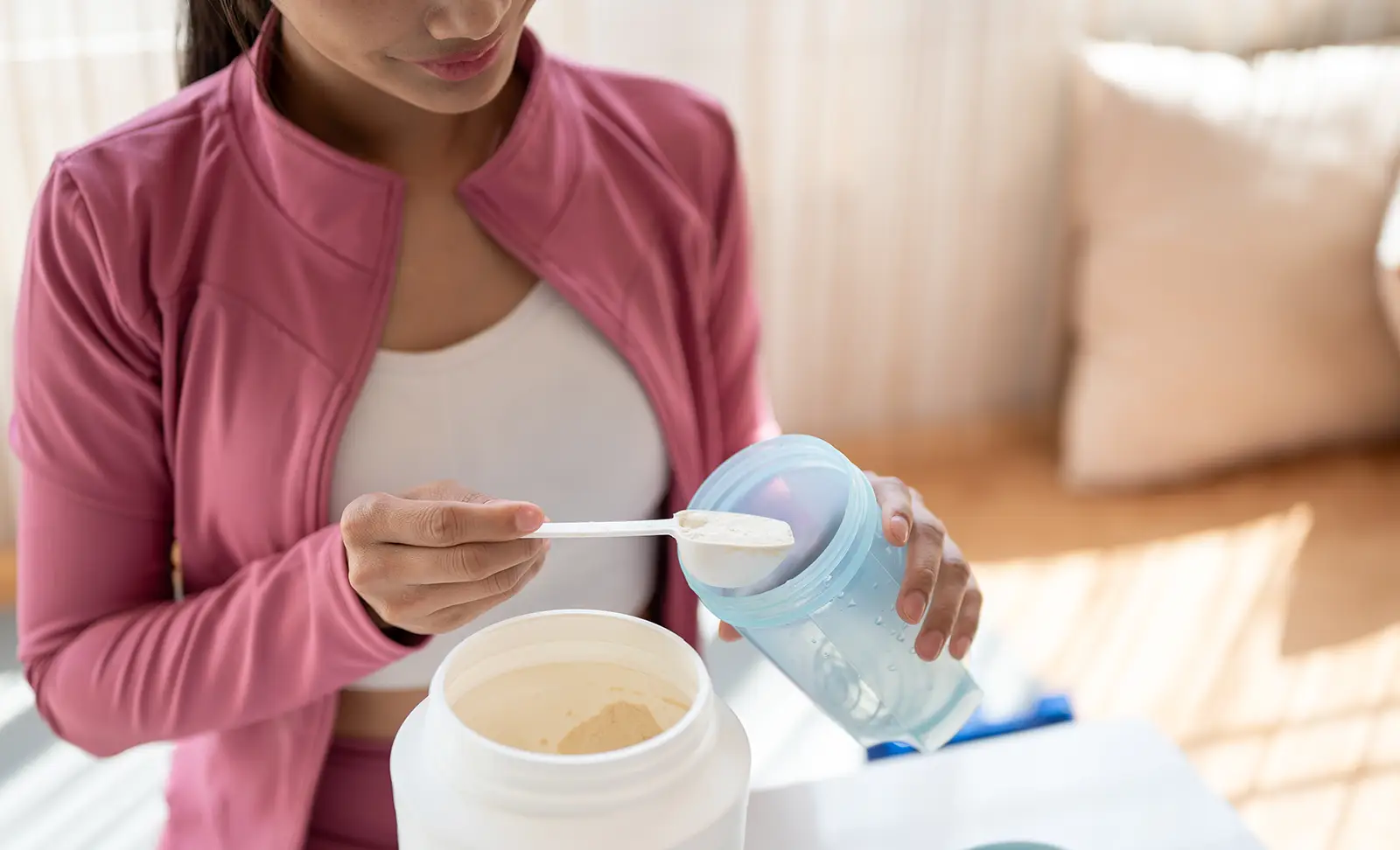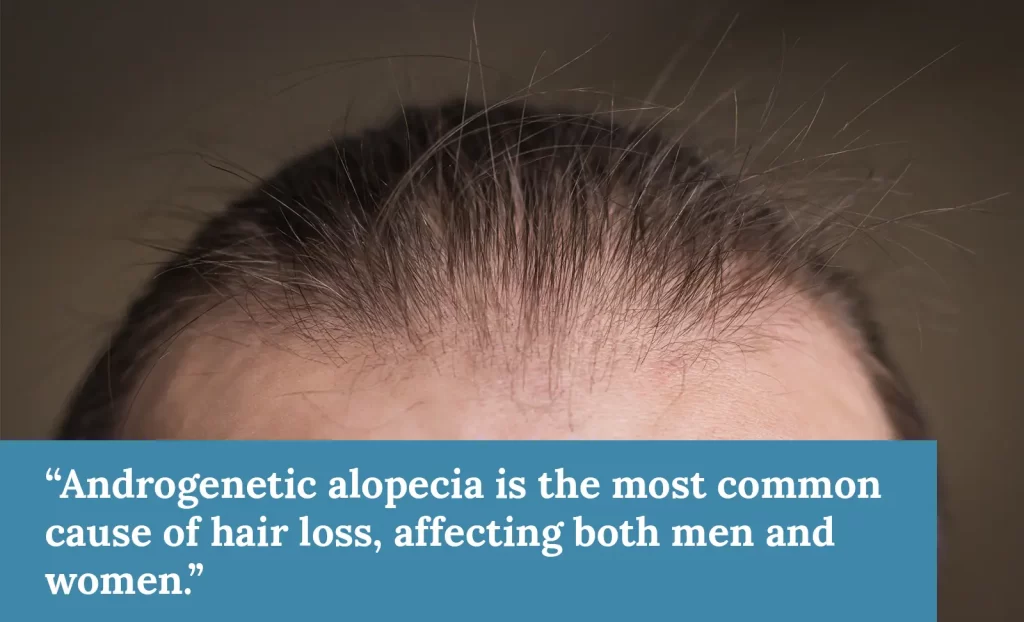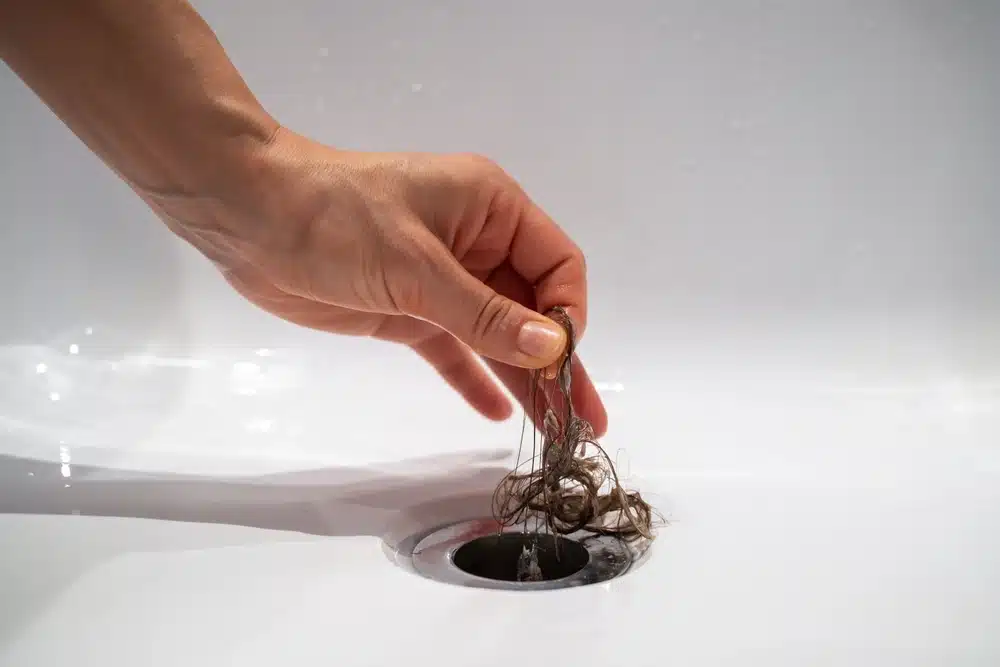Protein is an essential macronutrient made of amino acids. The body requires protein to function properly, and that includes growing healthy hair. This is because protein makes up the primary building block of hair strands, and not getting enough protein can affect those strand’s strength and elasticity. If a person has a deficiency, increasing protein intake can help regrow healthier locks.
- What is Protein? Protein is an essential macronutrient found in many foods, such as legumes and meats. It’s made of amino acids that support your overall health and repair cells.
- How Does Protein Affect the Hair? The hair is made of a specific protein called keratin. People need to consume enough protein so that their hair can grow healthy and strong.
- What Are the Signs of a Protein Deficiency? Common signs of a protein deficiency include fatigue, brittle nails, muscle weakness, dry skin, and brittle hair.
- How Do You Increase Protein Intake? Increase your protein intake by consuming high-protein foods, such as eggs, poultry, seafood, tofu, chickpeas, and nuts. You can also use protein powder and protein supplements. You need around 0.75g per every kilo of your body weight each day.
- What Are the limitations of Protein for the Hair? Increasing your protein intake will only help your hair if you have a deficiency. Plus, too much protein can even have a hindering effect, potentially causing hair shedding.
You have likely heard how essential protein is for a fit and healthy lifestyle. What about your hair? Everybody loves the idea of thick, healthy locks, but can a simple diet change make a difference?
In this article, learn all about the link between a high-protein diet and hair growth.
What is Protein, and Why is it So Important?
Proteins are molecules that consist of essential amino acids. Protein is present within the human body and the food we eat, and it is essential because it repairs the cells. [1] It’s particularly important in children and those who are pregnant, as they need enough protein for development.
If you do not get enough protein, you will notice unpleasant symptoms such as muscle loss, brittle nails, skin problems, anaemia, and osteoporosis. It can also dramatically impact your mood.
Does a High Protein Diet Help Hair Growth?
So, can a high-protein diet promote hair growth? Yes. A high protein diet and hair growth are linked. Think about it this way – the hair is made up of a protein called keratin, which is responsible for healthy hair growth. Without enough protein, the hair quickly becomes brittle, which can lead to breakage and even hair loss. It’s clear that protein is incredibly important for hair.
If you do not get enough protein in your diet, consuming more protein can benefit your locks. However, that only really works if you currently do not get enough protein – if you don’t have a protein deficiency, adding more protein to your diet may not make much of an impact.
The Signs of a Protein Deficiency
Do you think you have a protein deficiency that is affecting your hair health? Watch out for these telltale signs.
Swelling: It’s common for those with a protein deficiency to experience swelling all around the body due to a lack of blood circulation. You may experience this in your hands, feet, and legs.
Weakness: Not getting enough protein can lead to muscle weakness, which can particularly affect those over 50. There is also a link between protein loss and anaemia, which can cause intense fatigue.
Hunger: People who do not consume enough protein often feel very hungry. You may find you overeat foods that aren’t as rich in protein, such as carbohydrates.
Problems with Hair, Skin, and Nails: As well as affecting the hair, a protein deficiency can lead to brittle nails and dry skin. That is because your hair, skin, and nails are built of proteins such as collagen and elastin.
Injuries that Don’t Heal Fast Enough: Protein, specifically collagen, is necessary to heal your body, especially muscle injuries. If you do not get enough protein in your diet, that can lead to injuries that take a long time to heal.
How to Increase Your Protein for Hair Growth
Knowing that a lack of protein can contribute to hair loss as well as an array of other unpleasant symptoms, it makes sense to try and up your protein intake. Here’s how.
Eat More Protein-Rich Foods
The most obvious way is by eating more protein-rich foods. The good news is there are tons of delicious protein-heavy foods that span many dietary requirements. Some foods that contain a lot of protein include eggs, red meat, seeds, nuts, tofu, chickpeas, eggs, avocado, poultry, seafood, milk, and cheese. Many of these foods contain lots of essential fatty acids that will boost both your health and appearance. Also, it is best not to only include one source of protein in your diet, as you need a range of proteins for a healthier lifestyle and thicker hair.
Monitor Protein Intake
To ensure you are getting enough protein, monitor how much you eat. Start by understanding what you need, which is 0.75g of protein per kilo of body weight. [3] So, if a person weighs 60 kilos, they need 45g of protein daily.
It is especially important for those on a restrictive diet to look at how much protein they eat, as some diets can lead to a protein deficiency (as well as other nutrient deficiencies) quite quickly.
Take Protein Supplements
You can take a protein supplement if you do not get enough protein from your diet. These should be taken alongside a healthy, balanced diet.
Use Protein Powder
One of the simplest and most popular ways to up your protein intake is by using a protein powder, which you can add to smoothies, soups, yoghurts, oatmeal, and much more. People enjoy this method as it’s an easy way to combine protein with other nutrients while being more definitive with measurements.
Can You Reverse Hair Loss Caused by a Protein Deficiency?
Yes – hair loss caused by a protein deficiency can be reversed. The best way is to adjust your diet to include more protein. By eating more protein-rich foods, your hair will start to grow denser and thicker.
What Happens if You Consume Too Much Protein?
Consuming more protein for hair growth makes sense if you don’t get enough of the stuff, but what happens when you have too much? This can be just as problematic. It can lead to a range of unpleasant symptoms, including:
- Weight Gain
- Dehydration
- Intestinal Problems
- Constipation
- Diarrhoea
- Headaches
- Kidney Problems
- Blood Vessel Disorders
- Seizures
Protein overload can even lead to hair breakage and shedding due to build-up, worsening your hair loss. So, if you want to boost hair health, only consume how much protein is recommended, avoiding going overboard.
Other Causes of Hair Loss
While hair loss can be caused by a protein deficiency, there are many other potential causes – some of which are more common.
Androgenetic Alopecia
Androgenetic alopecia is the most common cause of hair loss, affecting both men and women (although it is more prevalent in men). It is genetic, although some things can trigger it, such as hormonal imbalances and stress.
Other Nutritional Deficiencies
Protein is not the only important nutrient you need for healthy hair. Other essential vitamins and minerals such as vitamin A, vitamin C, biotin, iron, zinc, and omega-3 fatty acids are crucial for stronger, denser strands. It’s all about a healthy diet. If you are deficient in any of these, it could lead to hair loss.
Hormonal Imbalances
A hormonal imbalance can cause hair loss, which is why hair loss is so common in those experiencing pregnancy, perimenopause, and menopause. It’s best to speak to your doctor if you think you have a hormonal imbalance.
Autoimmune Conditions
Several autoimmune conditions can cause hair loss, including alopecia areata, IBD (inflammatory bowel disease), and thyroid disease. It usually means the immune system attacks every hair follicle, leading to thinning hair and bald patches. If you think you have an autoimmune condition affecting your locks, speak to a doctor.
Hair Loss Solutions
What about hair loss solutions? While protein for hair growth works for those with a deficiency, that won’t work for all who experience hair loss. Here are other solutions (it helps to use a hair track app to monitor growth if you try one out).
Medications
Hair restoration medications like finasteride and minoxidil work well and can even help boost hair growth in those fixing a protein or other nutritional deficiency. You can get minoxidil over the counter but finasteride is prescription only. Also, finasteride cannot be taken by women (assigned at birth).
Clinical Treatments
There are several clinical treatments that aim to stimulate blood flow to the scalp, providing the follicles with the nutrients they need to revitalise. Two of the most effective are low-level laser therapy and PRP (platelet rich plasma) injections.

Some hair oils may be able to encourage new growth. Some oils known for their hair-boosting qualities include rosemary oil, peppermint oil, and pumpkin seed oil. You can even create a homemade blend to improve efficacy.
A Hair Transplant
For those who want a permanent, effective solution, consider a hair transplant. Hair transplants are modern and minimally invasive, involving the extraction and transplantation of individual hair follicles (when choosing the FUE method). They lead to natural results, and you will never have to worry about hair loss again, although some may require several procedures. Keep in mind that hair transplants are not recommended for hair loss caused by deficiencies, as that can be fixed with a diet change – instead, they work best for those with genetic hair loss or androgenetic alopecia.
Protein for Hair Growth: Final Thoughts
There is no denying how important protein is for healthy hair – after all, your hair is made up of keratin, which is a protein! If you have a deficiency, upping your protein intake can lead to thicker, denser hair overall. However, protein is not a miracle solution for hair loss; if you already consume enough protein in your diet, increasing your intake won’t make much difference, and overconsuming it can even lead to more problems.
If you have significant hair loss, protein for hair growth is likely not your best solution. Instead, look at effective hair restoration options like a hair transplant. Interested in learning more? Head to our patients gallery to see what we can do for our patients and their self-confidence.
Sources:




